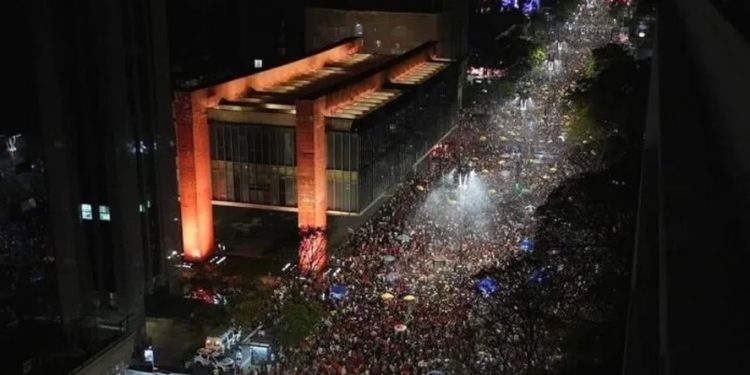By IWU-FI Press
31 October 2022. In the ballotage on Sunday 30 October, Lula won the election by a narrow margin. He won 50.9 per cent, almost 60 million voters, with two million votes over Bolsonaro. It was a very difficult and polarised election. The polls failed again, as they had announced 4 or 5 per cent more votes for Lula. Faced with this result, thousands and thousands of workers, young people, and women celebrated massively on Sunday night. They were mainly saluting the defeat and the end of the government of Jair Bolsonaro, a far right-wing, a repressor, a misogynist, a Covid denier and who attacked the rights of the Brazilian working class.
But evidently, the vote for the far-right Bolsonaro once again reveals that there is, besides a traditionally conservative and reactionary vote, a fringe of the working class and popular sectors, who voted for him. This popular fringe maintains a rejection of the previous governments of the PT, Lula and Dilma Rousseff, in alliance with the bosses’ sectors that imposed austerity measures on the people, and were corrupt. Evidently, it is merging itself as a nefarious political phenomenon that is going to survive in Brazilian politics, because it has won governorships and because it has the largest minorities in both the Deputies and Senators’ chambers.
It is also logical that in Latin America and the rest of the world, people are happy with the end of a far-right government in Brazil that adheres to Trump, Giorgia Meloni in Italy, Marine Le Pen in France or Vox in Spain. Or Javier Milei in Argentina, or the political sectors that vindicate Pinochet in Chile.
But Lula’s victory and his alliance with the centre-right Alckmin won’t be a good thing for the working people of Brazil. It’s a class conciliation government. This was also reflected throughout the campaign. At no time did Lula stand out for making any proposals in favour of working class demands or rejecting the payment of the foreign debt, to add funds to the health and education budgets. He even stressed his pact with the centre-right by denying, for example, the right to abortion, which does not exist in Brazil.
And all this has to do with what will be the perspective of a government in alliance with sectors of the bourgeoisie. The IWU-FI predicts that, unfortunately, it will repeat the failures of its first governments. It was precisely the last PT government with a bosses’ leader like Temer, who exposed the attack on the workers with a transport fare hike in 2013. That led to a reaction of millions of people in the streets rejecting the fare hike, repudiating the works for the World Cup (2014) and the corruption in members of the government, which ended up leading millions to vote in 2016 against the PT and which unfortunately Bolsonaro capitalised on.
We do not want to spoil it, but Lula’s new government will not meet the needs of the workers, but will rule with and for the bourgeoisie. So it will be a new disappointment, repeating the failures of the capitalist governments of doublespeak, of the false left, like Maduro, Evo Morales, Boric in Chile or Petro in Colombia.
That is why the Socialist Workers’ Current (CST), a radical current of the PSOL, the Brazilian section of the IWU-FI, in the first round did not accompany the majority decision of the PSOL to join the electoral alliance (Broad Front) with the bosses’ parties and politicians and unconditionally supported Lula’s candidacy. The CST in the first round called to vote for an independent left-wing candidate, Vera Lucia, of the Revolutionary Socialist Pole. And in the re-run, to vote critically for Lula, from an independent position. Accompanying millions and millions of workers, women and young people who logically wanted to get rid of Bolsonaro. But placing no trust or expectation in Lula’s next government.
First, from the CST and the IWU-FI, we call on the working class and the popular sectors of Brazil to continue fighting for their demands. They must trust in their mobilisation to get their immediate demands, such as an emergency wage increase; an increase in the budget for health and education; no to the payment of the foreign debt; to return to the state all privatised services; to fight against the plunder of multinationals, banks, and agribusiness, among other measures.
Second, we must continue to fight for the building of a new left alternative. A new left trade union and political leadership in Brazil. In this sense, the CST will continue to demand that the PSOL once again take an independent position vis-à-vis the bosses’ governments in power and, therefore, neither support nor join the Lula-Alckmin government. The CST and the IWU-FI will keep on struggling to build a united socialist and independent political alternative to the left to fight for genuine change in Brazil: a workers’ government and a socialist Brazil.













